10 start with H start with H
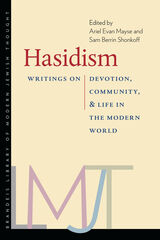
While this volume focuses on Hasidism, it wrestles with a core set of questions that permeate modern Jewish thought and religious thought more generally: What is the relationship between God and the world? What is the relationship between God and the human being? But Hasidic thought is cast with mystical, psychological, and even magical accents, and offers radically different answers to core issues of modern concern. The editors draw selections from an array of genres including women’s supplications; sermons and homilies; personal diaries and memoirs; correspondence; stories; polemics; legal codes; and rabbinic response. These selections consciously move between everyday lived experience and the most ineffable mystical secrets, reflecting the multidimensional nature of this unusual religious and social movement. The editors include canonical texts from the first generation of Hasidic leaders up through present-day ultra-orthodox, as well as neo-Hasidic voices and, in so doing, demonstrate the unfolding of a rich and complex phenomenon that continues to evolve today.
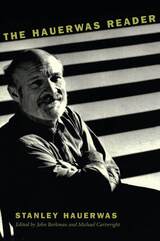
The editors of The Hauerwas Reader, therefore, have compiled and edited a volume that represents all the different periods and phases of Hauerwas’s work. Highlighting both his constructive goals and penchant for polemic, the collection reflects the enormous variety of subjects he has engaged, the different genres in which he has written, and the diverse audiences he has addressed. It offers Hauerwas on ethics, virtue, medicine, and suffering; on euthanasia, abortion, and sexuality; and on war in relation to Catholic and Protestant thought. His essays on the role of religion in liberal democracies, the place of the family in capitalist societies, the inseparability of Christianity and Judaism, and on many other topics are included as well.
Perhaps more than any other author writing on religious topics today, Hauerwas speaks across lines of religious traditions, appealing to Methodists, Jews, Anabaptists or Mennonites, Catholics, Episcopalians, and others.
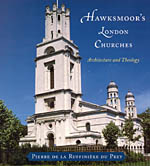
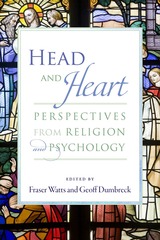
The fact that this distinction has been so persistent makes it an important area of study. Head and Heart: Perspectives from Religion and Psychology takes an inter-disciplinary approach, linking the thinking of theologians and philosophers with theory and research in present-day psychology. The tradition of using framing questions that have been developed in theology and philosophy can now be brought into dialogue with scientific approaches developed within cognitive psychology and neuroscience. Though these scientific approaches have not generally used the terms “head” and “heart,” they have arrived at a similar distinction in other ways. There is a notable convergence upon the realization that humans have two modes of cognition at their disposal that correspond to “head” and “heart.” The time is therefore ripe to bring the approaches of theology and science in to dialogue—an important dialogue that has been heretofore neglected.
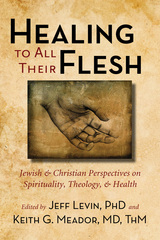

Nothing defines postmodernism so well as its refusal of depth, its emphasis on appearance and spectacle, its tendency to collapse a three-dimensional world in which image and reality are distinct into a two-dimensional world in which they merge. The postmodern world, Taylor argues, is a world of surfaces, and the postmodern condition is one of profound superficiality.
For many cultural commentators, postmodernism's inescapable play of surfaces is cause for despair. Taylor, on the other hand, shows that the disappearance of depth in postmodern culture is actually a liberation repleat with creative possibilities. Taylor introduces readers to a popular culture in which detectives—the postmodern heroes of Paul Auster and Dennis Potter—lift surfaces only to find more surfaces, and in which fashion advertising plays transparency against hiding. Taylor looks at the contemporary preoccupation with body piercing and tattooing, and asks whether these practices actually reveal or conceal. Phrenology and skin diseases, the "religious" architecture of Las Vegas, the limitless spread of computer networks—all are brought within the scope of Taylor's brilliant analysis. Postmodernism, he shows, has given us a new sense of the superficial, one in which the issue is not the absence of meaning but its uncontrollable, ecstatic proliferation.
Embodying the very tendencies it analyzes, Hiding is unique. Conceived and developed with well-known designers Michael Rock and Susan Sellars, this work transgresses the boundary that customarily separates graphic design from the story within a text. The product of nearly three decades of reflection and writing, Hiding opens a window on contemporary culture. To follow the remarkable course Taylor charts is to see both our present and past differently and to encounter a future as disorienting as it is alluring.
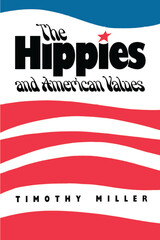
The hippies of the late 1960s were cultural dissenters who, among other things, advocated drastic rethinking of certain traditional American values and standards. In this lucid, lively survey, Timothy Miller traces the movement's ethical innovations and analyzes the impact of its ideas on subsequent American culture.
Dedicated to such tenets as the primacy of love, trust in intuition and direct experience, the rejection of meaningless work, and a disdain for money and materialism, the hippies advocated dropping out of the dominant culture, and proposed new and more permissive ethics in several areas. They argued that, while some drugs were indeed harmful, others provided useful insights and experiences and therefore should be freely available and widely used. They endorsed a liberal ethics of sex, in which no sexual act between or among consenting adults would be banned. They developed an ethics of rock-and-roll music, arguing that rock was the language of a generation and that it helped promote new ways of thinking and living. They also revived the venerable American tradition of communal living.
In contrast to most available literature on the 1960s, this book deals with the cultural revolutionaries and not the political radicals of the New Left. And instead of relying on later interviews with persons who were active in the 1960s, Miller draws mainly on underground newspapers of the day, the most important literary creation of the hippies themselves. The result is a historical encounter of rare immediacy.
Timothy Miller is assistant professor of religious studies at the University of Kansas.
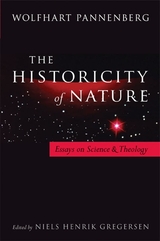
Known as one of the most outstanding theologians of the twentieth century, Wolfhart Pannenberg is also considered a great interdisciplinary thinker. Now, essays and articles on science and theology that are central to understanding Pannenberg's theories have been collected into one volume.
Niels Henrik Gregersen, a former student of Pannenberg and now professor of systematic theology at Copenhagen University, has compiled the writings in four sections: Methodology, Creation and Nature's Historicity, Religion and Anthropology, and Meaning and Metaphysics. Included in this volume are:
•Translations of Pannenberg's principled argument for the consonance between science and religion, including contingency and laws of nature, field theories and space-time, and divine action•Translations of Pannenberg's theory of theology as a rational hypothetical science, including his discussions with leading British and American scholars such as A. N. Whitehead, John Cobb, and Langdon Gilkey
•Previously unpublished articles on the problems between science and theology in the course of modern history, explaining why chance may be more important for theology than design
•Translations of seminal articles that articulate Pannenberg's understanding of the role of religion in human nature
•One of the few theological articles on aggression as a psychological and social phenomenon
With this collection, the essays of this important contemporary theologian and his illuminating views are presented in one convenient volume.
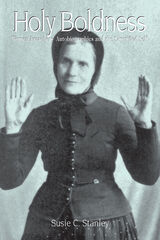
From its inception in the nineteenth century, the Wesleyan/Holiness religious tradition has offered an alternative construction of gender and supported the equality of the sexes. In Holy Boldness, Susie C. Stanley provides a comprehensive analysis of spiritual autobiographies by thirty-four American Wesleyan/Holiness women preachers, published between the mid-nineteenth and mid-twentieth centuries. While a few of these women, primarily African Americans, have been added to the canon of American women’s autobiography, Stanley argues for the expansion of the canon to incorporate the majority of the women in her study. She reveals how these empowered women carried out public ministries on behalf of evangelism and social justice.
The defining doctrine of the Wesleyan/Holiness tradition is the belief in sanctification, or experiencing a state of holiness. Stanley's analysis illuminates how the concept of the sanctified self inspired women to break out of the narrow confines of the traditional “women's sphere” and engage in public ministries, from preaching at camp meetings and revivals to ministering in prisons and tenements. Moreover, as a result of the Wesleyan/Holiness emphasis on experience as a valid source of theology, many women preachers turned to autobiography as a way to share their spiritual quest and religiously motivated activities with others.
In such writings, these preachers focused on the events that shaped their spiritual growth and their calling to ministry, often giving only the barest details of their personal lives. Thus, Holy Boldness is not a collective biography of these women but rather an exploration of how sanctification influenced their evangelistic and social ministries. Using the tools of feminist theory and autobiographical analysis in addition to historical and theological interpretation, Stanley traces a trajectory of Christian women’s autobiographies and introduces many previously unknown spiritual autobiographies that will expand our understanding of Christian spirituality in nineteenth- and twentieth-century America.
The Author: Susie C. Stanley is professor of historical theology at Messiah College. She is the author of Feminist Pillar of Fire: The Life of Alma White.
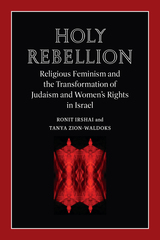
In Holy Rebellion, Ronit Irshai and Tanya Zion-Waldoks examine social change in Israel through a rigorous analysis of the shifting entanglements of religion, gender, and law in times of cultural transformation. They explore theological, halakhic, political, and sociological processes and show how they interact with one another in ways that advance women’s rights, as well as how they are met with a conservative backlash in the discourses and actions of the rabbinic establishment. Irshai and Zion-Waldoks build on legal philosopher Robert Cover’s 1982 paper “Nomos and Narrative,” which explained how cultural narratives and legal norms are reciprocally enforced or transformed. Expanding on this notion, Irshai and Zion-Waldoks propose a “narrative ripeness test,” an analytic tool that evaluates the relationship between culture and law to assess how and when change within a minority cultural community may be accelerated or hindered by state intervention.
Religious feminisms are emerging around the world, not solely in Israel, and this book helps elucidate how they create enduring and radical change. Many liberal states are also confronting an illiberal backlash and question the multicultural framework’s ability to serve the needs of minorities within minorities. Therefore, the theoretical framework offered by Irshai and Zion-Waldoks is applicable beyond the Israeli case, even as it offers deeper insights into an Israeli society in turmoil.
READERS
Browse our collection.
PUBLISHERS
See BiblioVault's publisher services.
STUDENT SERVICES
Files for college accessibility offices.
UChicago Accessibility Resources
home | accessibility | search | about | contact us
BiblioVault ® 2001 - 2024
The University of Chicago Press









